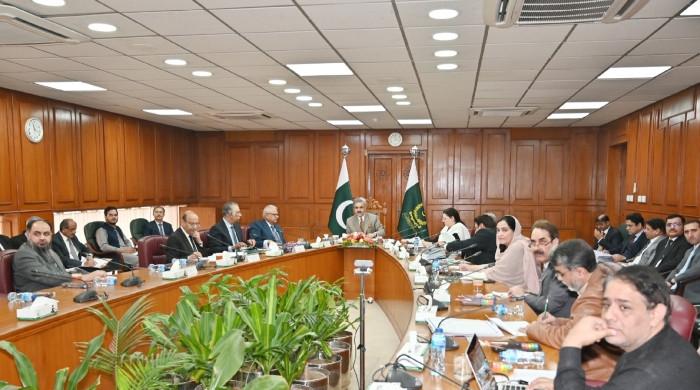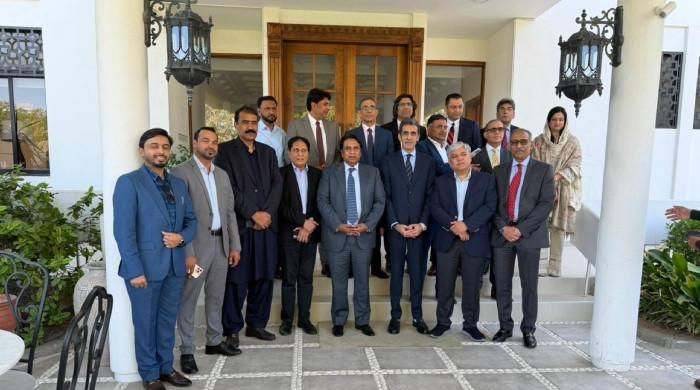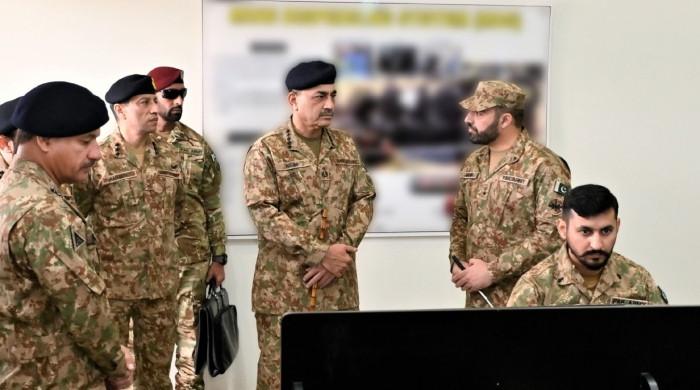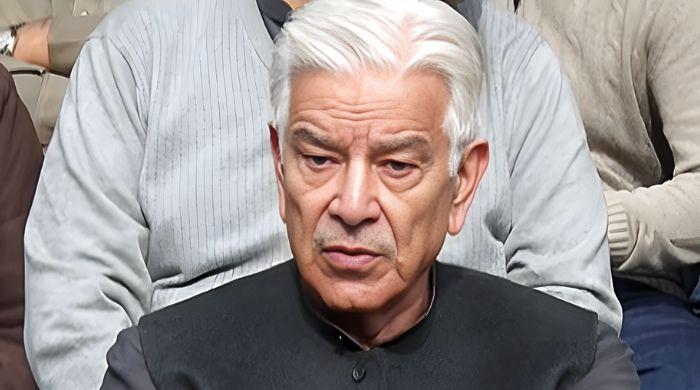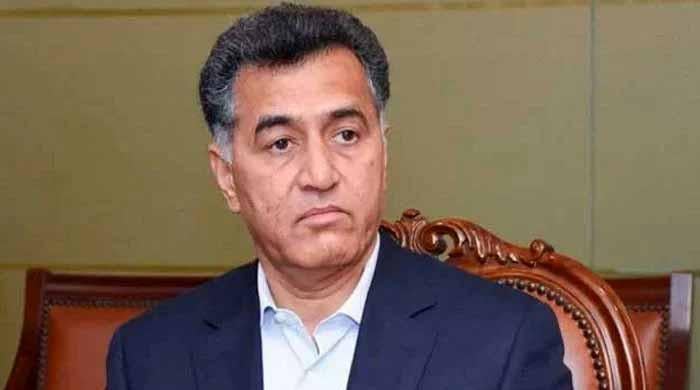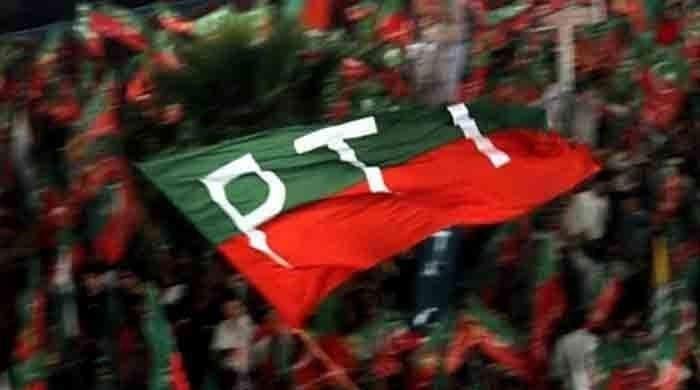Civil-military leadership vows to 'take tough decisions' to fix ailing economy
COAS Gen Munir reassures "fullest support of Pakistan Armed Forces to backstop" govt's economic initiatives
March 21, 2024
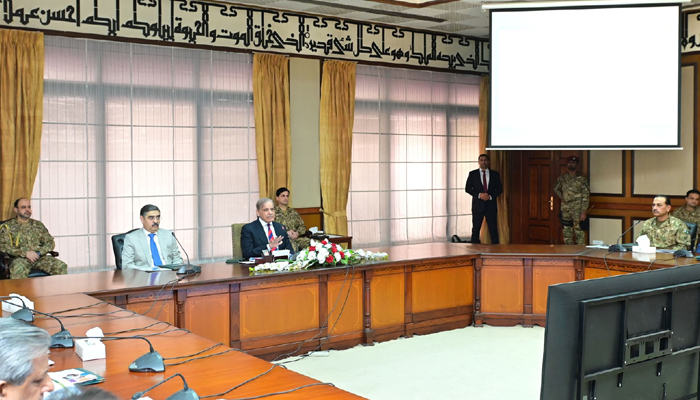
- Committee underscores need for continuing consensual approach.
- Civil-military leadership vows to ensure continuation of policies.
- Iron resolve needed to serve country like never before: PM Shehbaz.
ISLAMABAD: The civil-military leadership has yet again reiterated their resolve to ensure the continuation of policies and take tough decisions to pull the country out of the economic crisis.
The pledge was expressed at an apex committee meeting of the Special Investment Facilitation Council (SIFC) — a civil-military forum established to attract foreign investment.
The meeting was chaired by Prime Minister Shehbaz Sharif and attended by former caretaker PM Anwaar Ul Haq Kakar, Army Chief General Asim Munir, members of outgoing and incoming federal cabinet, provincial chief ministers, and high-level government officials, according to an official statement issued following the huddle.
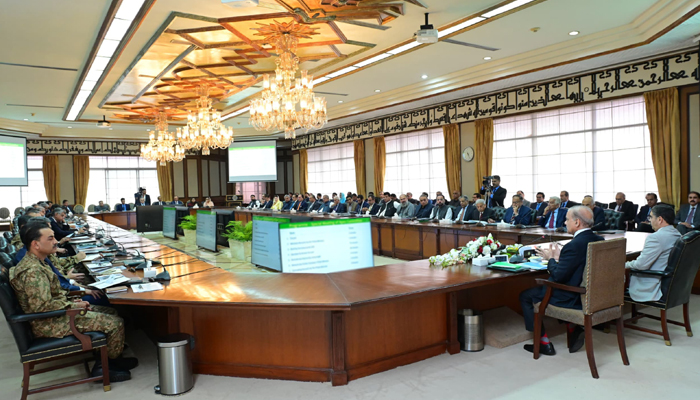
The apex committee underscored the need of continuing a consensual approach under SIFC to navigate the myriad of challenges being faced by the country.
The civil-military body also vowed to ensure continuation of policies and take tough decisions in the larger interest of the country by setting correct economic priorities.
Army Chief Gen Munir reassured the fullest support of Pakistan Armed Forces to backstop the economic initiatives of the government and ensured the provision of safe, secure and conducive environment to nurture the country’s true economic potential, according to the communique.
PM Shehbaz said that SIFC is the way forward under the challenging times and an iron resolve is needed to serve the country like never before.
He urged the federal cabinet to join hands, keep political differences aside, and work as a cohesive team to keep the momentum of economic stability.
He also thanked the caretaker government for continuation of larger national economic agenda in a “befitting manner”.
Marking a “historic moment of seamless transition,” the meeting was conducted with a singular focus of briefing the cabinet in the presence of the caretaker cabinet, the statement added.;
The apex committee was briefed about the SIFC initiative and major contributions made towards the investments, privatisation and overall micro-economic stabilisation of the country.
“The committee admired the leadership of Prime Minister Shehbaz Sharif for envisioning and launching the SIFC in June 2023, which has now moved from its formative phase and evolved progressively under the caretaker government,” read the statement.
The former caretaker prime minister congratulated PM Shehbaz, cabinet members and chief ministers on assuming their responsibilities and wished them good luck for dealing with economic challenges and transforming Pakistan as one of the top economies of the world.
'New IMF programme likely to continue for three years'
Addressing the SIFC's apex committee meting, PM Shehbaz signalled that the new International Monetary Fund (IMF) programme is likely to be continued for three years.
"New tranche of loan is likely to be received from the IMF in a few days, however, we would need another programme," he said.
The premier said that civil-military leadership, including elected lawmakers from different political parties, gave a clear message of unity for development, and prosperity of the country by attending today's session.
He added that the former coalition government, comprised of 13 political parties, decided to prioritise the country over their politics.
"There are major challenges to national economy. The SIFC is an important platform which was primarily establishment to remove hurdles in foreign investments, and it held several meetings during the last eight months." Chief of Army Staff (COAS) General Syed Asim Munir played vital role in SIFC’s formation, he added.
PM Shehbaz also emphasised on introducing reforms under the IMF programme as the country needs macroeconomic stability. "We have Rs9 trillion revenues, which should be Rs13 to 14 trillion."
The federal government, he said, would digitise the Federal Board of Revenue (FBR). Electricity theft gives an annual financial dent of Rs400 billion to the national exchequer. During the caretaker government, electricity worth Rs87 billion was saved by taking anti-power measures.
He also pointed out that electricity and gas circular debt has soared to Rs5 trillion. “There is a coalition government in the Centre, whereas, different political parties are ruling provinces. The Centre cannot counter all challenges alone, therefore, we should set aside our political differences, and work together to pull the country out of crisis.”
PM Shehbaz also urged to expedite privatisation process of the loss-making state-owned entities, like Pakistan International Airlines (PIA) which is under debt of Rs825 billion.
“We have to take many bitter decisions,” the prime minister said, admitting that subsidies had been granted to elites of the country which should not be repeated. He added that financial burden, following decisions, should be shifted to those segments that could bear it.
Pakistan-IMF strike SLA
With a clear-headed approach adopted by newly appointed Finance Minister Muhammad Aurangzeb, Pakistan and the global lender struck a staff-level agreement (SLA) for the completion of the second review and release of the third tranche of $1.1 billion under the Standby Arrangement (SBA) programme, The News reported.
After striking the SLA, the IMF confirmed that Pakistani authorities expressed interest in a successor medium-term Fund-supported programme to permanently resolve Pakistan’s fiscal and external sustainability weaknesses, strengthening its economic recovery and laying the foundation for strong, sustainable and inclusive growth.
While discussions are expected to start in the coming months, the IMF says the key objectives of the upcoming IMF sponsored programme are expected to include:
(i) strengthening public finances, including through gradual fiscal consolidation and broadening the tax base (especially in undertaxed sectors) and improving tax administration to better debt sustainability and create space for higher priority development and social assistance spending to protect the vulnerable;
(ii) restoring the energy sector’s viability by accelerating cost reducing reforms including improving electricity transmission and distribution, moving captive power demand to the electricity grid, strengthening distribution company governance and management, and undertaking effective anti-theft efforts;
(iii) returning inflation to target, with a deeper and more transparent flexible FX market supporting external rebalancing and the rebuilding of foreign reserves; and
(iv) promoting private-led activity through the above mentioned actions as well as removal of distortionary protection, advancement of state-owned enterprise (SOE) reforms to improve the sector’s performance, and scaling-up of investment in human capital, to make growth more resilient and inclusive and enable Pakistan to reach its economic potential.




